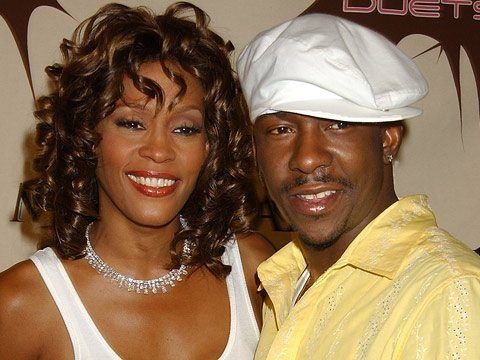Gotta love You Tube 🙂
Originally published 2/20/2012
First and foremost if you have not read the tribute to Whitney Houston by my esteemed colleague Soul Sister, it is definitely a must read and primed to be shared amongst fans of one of the greatest vocalists of a generation.
I happened to catch this clip today and I wanted to just point out a few things that I think are important and how they support how much of a pro Whitney Houston was barely out of her teens.
This performance with the “Late Night” Band: Paul Shaffer (Keyboards and Musical Director), Sid McGinnis (Guitar), Will Lee (Bass) and Steve Jordan (Drums) is exactly what the doctor ordered when looking for examples that young aspiring artists could benefit from.
It is well documented and the evidence is in the output shows that Whitney Houston was a very disciplined performer. It can be said that there are many “talented” persons in the world, but what separates a talent from an extremely gifted professional is the preparation and discipline.
Let’s look at a couple of performance factors in this clip that are traits that aspiring professionals would benefit from spending some serious time emulating.
TIME
As Duke Ellington implored us and James Brown and many others hit us with, the time, the feel, the rhythm is everything and I mean everything. You can have someone stand in front of you and sing the prettiest notes in the world but if they don’t have great time, great feel, if they can’t make the music swing you are going to get bored very quickly.
At the 0:06 mark Steve Jordan sets the tempo with his drum fill into the downbeat of the intro. The intro here is about 10 seconds long. “Saving All My Love For You” is a soft shuffle by nature given that it is in triple meter (4 groups of 3 to be exact) 12/8. Watch what happens though at the 0:16 mark upon Whitney’s vocal entrance… at first you’re not sure about it because Whitney is not making a robotic entrance, Whitney is controlling the time with her phrasing. Steve Jordan set the time, Whitney controls it.
If you watch her foot a couple of seconds after her first phrase you can see she is feeling the pulse, the tempo there and then later on you will see her trademark: middle and ring fingers hitting the mic on the backbeat. If you listen to the music by the 0:20 mark the entire band is feeling the time as Whitney conducts it. Just watch how she moves, that’s what a conductor does. You have to have a sense of time that permeates your entire being.
Learn to count but more importantly learn to feel. Become so sensitive to time that you will automatically know when something is too fast or to slow and then learn how to fix it, immediately, on stage if you have to.
PITCH
What I always loved about listening to Whitney Houston is that I could always hear the notes. Many singers and other instrumentalists slide into and off of notes and never give you a precise pitch. For many, the idea of singing notes dead-on is boring, but truth be told it’s actually difficult if you do it right and it takes discipline.
Listen to the first verse… you could not play that melody any better if you sat at the piano with the score. Whitney plays with the phrasing and time a little bit as we alluded to earlier, but pitch and interval wise it’s just on the money and she gives you two, not ten, but two riffs in that whole sequence. That should be repeated: Whitney on the first verse in this performance only did two small vocal riffs. The reason for that is that you are establishing the theme. If you are singing a song that no one has heard and you are riffing and running all over the place in the first verse, how do we know what the theme is, the main melody? Plus if you put all the fireworks in the beginning what do we have to look forward to at the end?
THE INSTRUMENT
Now granted certain things about our own individual voices we are just born with, but we still need to develop, practice and grow. You can hear all of the time Whitney had spent singing up to that point in her life in this performance. She is comfortable, the breath support is there, there is a clarity and an effortlessness in dealing with the demands of this song. What is required to sing this song vocally at minimum is an almost two octave range that the melody inhabits. Some of you may be saying that doesn’t sound like too much, I mean I’ve heard of people with vocal ranges that encompass blah, blah, blah octaves. Yes you have but please realize that many songs that you listen to, especially today, struggle to even fit in an octave. That’s what occurs when you have a lot of repeated notes, but that’s another blog for another day.
To sing this song you have to be able to bring it from the depth to the height and on that high end flip few can match Whitney when she puts that E5 into her head voice, there’s so much weight and clarity there that you know it was something that she worked very hard at and that she was trained well in. Many a vocal would be blown out trying to drag the chest voice up there, but many have because they just don’t know any better.
CONClUSION
There’s so much more I could go on and on about in this clip, but I did want to mention what a gift that band was and is… this was the original “Late Night” band from when the show started in ’82. Growing up I learned so much from all of them about what it means to accompany, they give Whitney sooo much here and everyone understands their respective role. Look at the smile on Whitney’s face when they get to the final 3rd of the piece… everyone lets loose and they truly take it home.
Finally, a thought about teachers, mentors, mommies, daddies, people who work with and are truly concerned about the success of young people. We need you, our children need you. We need you to look out for their interest and not your own interests through them but a sincere interest in their well-being as people first, musicians second.
Cissy Houston and her circle took time with Whitney, gave her guidance about what worked musically and what didn’t work. That’s love. I thank you Cissy Houston for all the time you spent with your daughter in her formative years, giving her the foundation that truly made her the greatest voice of a generation. You cannot get to that title in an afternoon, a weekend, a month, nor a year, that’s a lifetime journey of hard work and dedication.
Ivan Orr is a multi-instrumentalist, composer, performer, and writer. A native of Charlottesville, Virginia Ivan was involved with the forming and nascent days of The Music Resource Center as its first Program Director. A graduate of Virginia Commonwealth University’s Department of Music, Ivan currently resides in Richmond, VA where he maintains an active performance and production schedule while serving as the Music Editor for Grown Folks Music, a position he has held since 2010.
RELATED POSTS
January 11, 2011
Teach Your(Our) Children Well Pt.1
December 19, 2010
Sunday Praise: Whitney Houston – A Quiet Place
August 1, 2012
Whitney Houston: Artist of the Month August 2012
December 24, 2012
Vivian Green Pays Tribute To Whitney Houston in NYC
June 12, 2010
Soulive-Jesus Children of America
September 16, 2009




